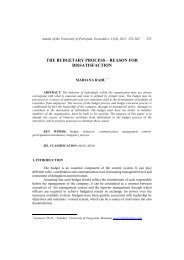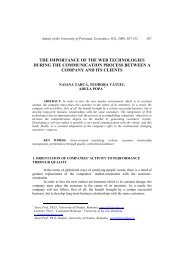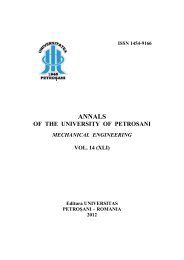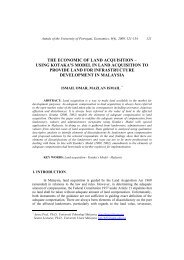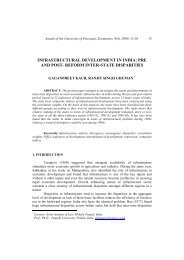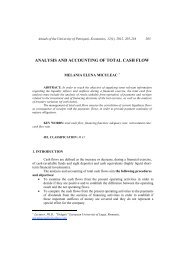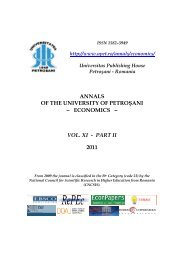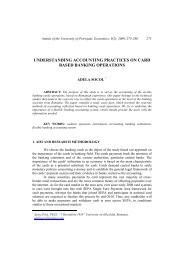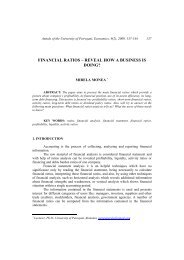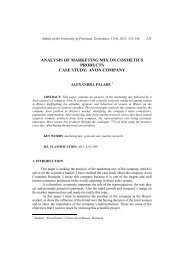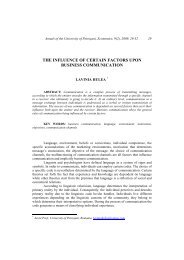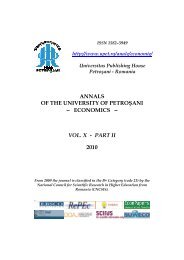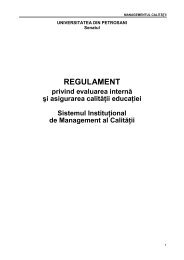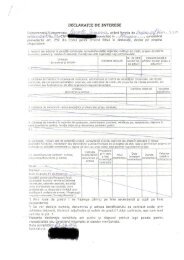annals of the university of petroÅani â¼ economics â¼ vol. xi - part i ...
annals of the university of petroÅani â¼ economics â¼ vol. xi - part i ...
annals of the university of petroÅani â¼ economics â¼ vol. xi - part i ...
You also want an ePaper? Increase the reach of your titles
YUMPU automatically turns print PDFs into web optimized ePapers that Google loves.
Annals <strong>of</strong> <strong>the</strong> University <strong>of</strong> Petroşani, Economics, 11(1), 2011, 215-222 215<br />
THE ROLE OF THE INTERNAL AUDIT IN THE TOURISM<br />
UNIT’S RISK MANAGEMENT PROCESS<br />
BOGDAN RĂVAŞ <br />
ABSTRACT: Management plans, organizes, and directs <strong>the</strong> performance <strong>of</strong> sufficient<br />
actions to provide reasonable assurance that objectives and goals will be achieved.<br />
Management periodically reviews its objectives and goals and modifies its processes to<br />
accommodate changes in internal and external conditions. Management also establishes and<br />
maintains an tourism unital culture, including an ethical climate that fosters control.<br />
Control is any action taken by management to enhance <strong>the</strong> likelihood that established<br />
objectives and goals will be achieved. Controls may be preventive (to determine undesirable<br />
events from occurring), detective (to detect and correct undesirable events which have<br />
occurred), or directive (to cause or encourage a desirable event to occur). The concept <strong>of</strong> a<br />
system <strong>of</strong> control is <strong>the</strong> integrated collection <strong>of</strong> control components and activities that are used<br />
by an tourism unit to achieve its objectives and goals.<br />
KEY WORDS: audit; tourism; management; evaluation; control.<br />
JEL CLASSIFICATION: M42, M48.<br />
The scope <strong>of</strong> internal auditing work in a tourism unit should encompass a<br />
systematic, disciplined approach to evaluating and improving <strong>the</strong> adequacy and<br />
effectiveness,<strong>of</strong> risk management, control, and governance processes and <strong>the</strong> quality <strong>of</strong><br />
performance in carrying out assigned responsibilities. The purpose <strong>of</strong> evaluating <strong>the</strong><br />
adequacy <strong>of</strong> <strong>the</strong> tourism unit's e<strong>xi</strong>sting risk management, control, and governance<br />
processes is to provide reasonable assurance that <strong>the</strong>se processes are functioning as<br />
intended and will enable <strong>the</strong> tourism unit's objectives and goals to be met, and to<br />
provide recommendations for improving <strong>the</strong> tourism unit's operations, in terms <strong>of</strong> both<br />
efficient and effective performance. Senior management and <strong>the</strong> board might also<br />
provide general direction as to <strong>the</strong> scope <strong>of</strong> work and <strong>the</strong> activities to be audited.<br />
Internal auditors should consider some suggestions when evaluating <strong>the</strong> nature<br />
<strong>of</strong> <strong>the</strong> internal audit tourism activity's work. These sugestions are not intended to<br />
represent all <strong>the</strong> considerations that may be necessary during such an evaluation, but<br />
simply a recommended set <strong>of</strong> items that should be addressed.<br />
Assist.Pr<strong>of</strong>., Ph. D, University <strong>of</strong> Petrosani, ravasbogdan@yahoo.com



